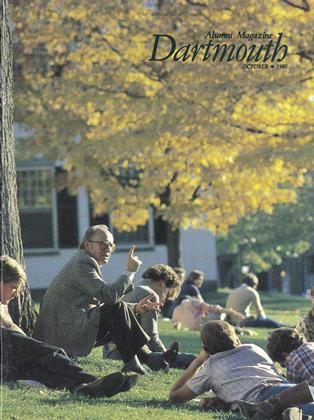When the Chevrolet "Nova" was first marketed in South America it sold poorly until someone realized that to Spanishspeaking peoples, the name of the car suggested "no go" or "does not go." The introduction of Pepsi to the Taiwan market had similarly disastrous results; when first translated, the soft drink's slogan, "Come Alive with Pepsi," inadvertantly carried the sacrilegious message, "Pepsi brings your ancestors back from the grave."
Dartmouth professor John Rassias cites such seemingly laughable incidents as evidence of the growing importance of languages in successful international trade. U.S. businesses have lost incalculable billions of dollars in revenues because of the inability of most Americans to speak or understand any language other than English, says Rassias. Reversing that trend is a growing emphasis of the College's summer language study programs. More than a hundred top national and international business executives came to Dartmouth this summer, swapping board rooms for class rooms to study a foreign language. The drawing card for most of them was the irrepressible Rassias, the William R. Kenan Professor of French and Italian, the director of the College's Language Outreach programs, and the originator of the unorthodox Dartmouth Intensive Language Model. Also a member of President Carter's Commission on Foreign Languages and International Studies, he has long argued that the United States is seriously disadvantaged in intellectual, diplomatic, and financial circles by its limited understanding of foreign languages and cultures. More than 20 years ago, he developed an unconventional method of teaching languages and cultures to Peace Corps volunteers and he has since extended the method to teaching scores of languages at more than 600 schools and universities worldwide. His students have come to expect just about anything, including being kissed on both cheeks, having raw meat slapped on them, or watching Rassias douse himself with water to make a point. But the antics are only one part of a systematic method that emphasizes total immersion into the language and culture being studied, rapidfire oral drills, a strong grammatical base, and a liberal dose of humor. The goal, he explains, is to break down inhibitions to learning and trying out new ideas.
Among the business executives who spent part of their summer with the Rassias method were 85 young corporate presidents on a ten-day program in French or Spanish sponsored by the Young President's Association, a nonprofit educational group whose members are presidents and chairmen of their companies. Citicorp of New York sent 11 of its South American executives to Hanover for ten days as well, to learn English language and American culture. Business executives also make up a large percentage of participants in the College's Alumni Language Program, which in its fourth consecutive summer offered French, Spanish, Italian, German, and Russian. In addition, Rassias earlier in the year organized a special ten-day program in German for IBM executives and is planning a similar session in Japanese later in the fall.
 View Full Issue
View Full Issue
More From This Issue
-
 Cover Story
Cover Story"Are the fireflies ghosts?"
October 1985 By Priscilla Sears -
 Article
ArticleEfrain Guigui: Well-tempered conductor
October 1985 By Georgia Croft -
 Sports
SportsOn the road to Cambridge. The Harvard Game
October 1985 By Jim Kenyon -
 Class Notes
Class Notes1979
October 1985 By Burr Gray -
 Article
ArticleThomas V. Seessel '59: "It's okay to say 'No' "
October 1985 By Rex Roberts -
 Class Notes
Class Notes1982
October 1985 By Emily P. Bakemeier







